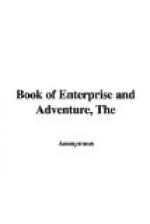Although perfectly blind, he was considered one of the best sporting elephants of his small size in the country, and he travelled at a tolerably good rate, and was remarkably easy in his paces.
ANECDOTES OF THE TIGER.
An occurrence nearly similar happened to me soon after, which put an end to my shooting on foot. From that time to the period of my leaving Chittrah, which was many years after, I always went out to shoot on an elephant. The circumstance I allude to was as follows:—Fifty or sixty people were beating a thick cover. I was on the outside of it, with a man holding my horse, and another servant with a hog’s spear; when those who were driving the cover called Suer! Suer! which is the Hindoostanee name for hog. Seeing something move the bushes about twenty yards from me, and supposing it to be a hog, I fired at the spot, with ten or a dozen small balls. Instantly on the explosion of my gun, a tiger roared out, and came galloping straight towards us. I dipped under the horse’s belly, and got on the opposite side from him. He came within a few yards of us, and then turned off growling into the cover.
When the people came out, they brought with them a dead hog, partly devoured. These two cases, I think, shew clearly that tigers are naturally cowardly. They generally take their prey by surprise, and whenever they attack openly, it is reasonable to conclude that they must be extremely hungry; which I believe is often the case, as their killing animals of the forest must be very precarious. It is the general opinion of the inhabitants, that when a tiger has tasted human blood he prefers it to all other food. A year or two sometimes elapses without any one being killed by a tiger for several miles round, although they are often seen in that space, and are known to destroy cattle; but as soon as one man is killed, others shortly after share the same fate. This, I imagine, is the reason why the natives entertain an idea that they prefer men to all other food. I account for it otherwise. Tigers are naturally afraid of men, and, in the first instance, seldom attack them, unless compelled by extreme hunger. When once they have ventured an attack, they find them much easier prey than most animals of the forest, and always to be met with near villages, and on public roads, without the trouble of hunting about for them through the covers.
A tigress with two cubs lurked about the Kutkumsandy pass, and during two months killed a man almost every day, and on some days two. Ten or twelve of the people belonging to government (carriers of the post-bags) were of the number. In fact, the communication between the Presidency and the upper provinces was almost entirely cut off. The government, therefore, was induced to offer a large reward to any person who killed the tigress.
She was fired at, and, adds Mr. J., never ... “heard of after;” from which it may be presumed she was wounded. It is fortunate for the inhabitants of that country, that tigers seldom survive any wound; their blood being always in a state predisposing to putrefaction, consequence of the extreme heat, and their living entirely on animal food....




